How Much Does an Ecommerce Website Cost in 2025? [UK Latest Price List]

Are you thinking about taking your business online or starting a new ecommerce website? The first thing that may come to your mind is: How much will it cost to have an ecommerce website? There is no one answer to this question. But it is important to know about all the costs before you plan your budget.
If your business is not on the internet, then your business will be out of business —— Bill Gates
This blog will explain the costs of building an ecommerce website in the UK. We will also talk about why being online is so important for businesses today. Plus, you will get some helpful tips to plan your ecommerce steps in a good way.
Today, it has become crucial for businesses to have a strong and easy-to-use ecommerce website to keep up with the latest trends.
Let’s begin by examining the importance of having an ecommerce website.
Why is an Ecommerce Website Important?
Before diving into the cost of a website, let’s understand why investing in an ecommerce website is no longer optional, but a necessity for businesses of all sizes.
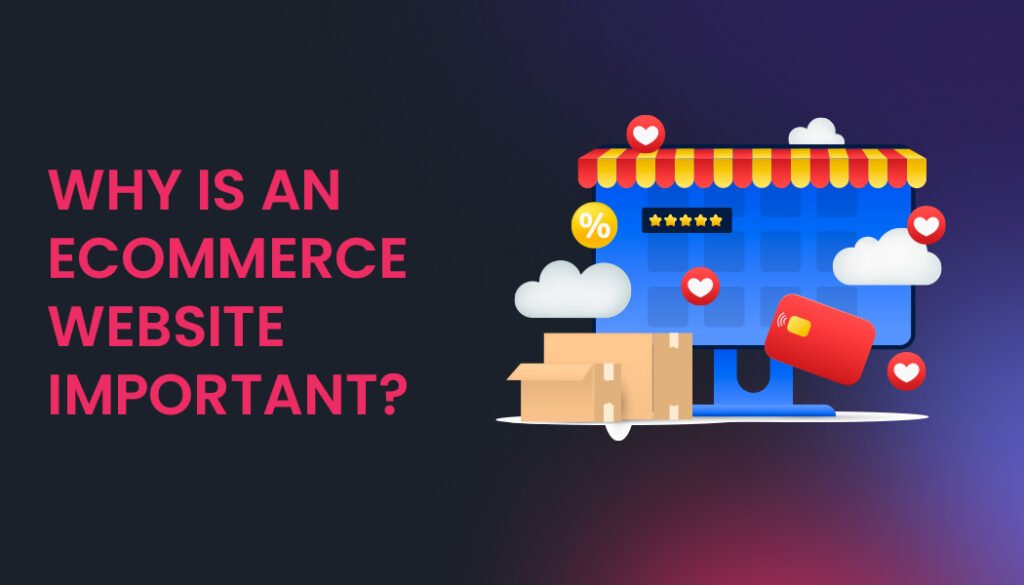
Business Reach will Expand
The eCommerce website is a convenient and effective means for accessing a diverse customer base without the constraints of geographic locality. For instance, a Cosmetic shop situated in an old town with a small local area can be the illustration. Without any online representation, no matter how good or bad they are, they will remain “an intimate local business”. Nevertheless, the website where the business is to be sold displaying products to customers all around the world determines the presence of the online business.
In addition to widening avenues for sales, this wider access also broadens the use of different markets simultaneously, mitigating the risk associated with reliance on a single market.
Convenience for Customers
In the 21st century, what you offer them would determine if the consumers are going to buy from you or go to the next shop down the road. Thereby, an ecommerce site provides consumers the most convenient opportunity of shopping 24/7 at home without worrying about getting to stores during working hours and finding necessary things in stock.
Take for example the businessman who cannot squeeze some few hours during daylight. He can access it and perform the required tasks at his own convenience, thus, enhancing his shopping experience. It is this supply side convenience that gained this channel a meaningful portion of reference in this.
Cut Down on Unnecessary Costs
A virtual store requires fewer financial resources in comparison with real estate issues and other maintenance a physical store may require. Let’s explore the expenditures connected to opening a physical store, like a workplace rental fee, energy bills, and payroll. Entrepreneurs are well able to cut on operational expenses or do away with these charges altogether as they embrace the trend of eCommerce.
An example of this would be when an apparel brand opts to spend the money they would use renting a premium retail space, say a mall, on improving the online shopping experience and marketing efforts or other areas.
Better Customer Insights
The head of the ecommerce sector in the UK can gather valuable information on clients‘ behaviour, in other words it offers them a gold mine of data that can be helpful for further decisions. For instance, an online retailer might see that a certain product shows up more often in searches and is eventually bought, committing them to emphasize that line in their next marketing move.
In addition, they can capture users’ behavioural patterns regarding their age segments, thus enabling them to place their merchandise assortment and product assignments reflecting their target groups. With this method, businesses can take decisions based on the feedback they get and, therefore, to be able to improve the products continually.
Easy to Scale and Adapt Latest Trends
Ecommerce websites offer tremendous scalability. This means that as your business grows, your online store can easily adapt to accommodate increasing product listings, traffic, and transactions.
As the business gains popularity and introduces new product lines, the Latest eCommerce platform can seamlessly scale up to handle the growing inventory and customer base. This scalability ensures that your business can keep up with demand without major disruptions.
Enhanced Customer Engagement
Ecommerce sites offer different online tools and means through which our customers become engaged. In addition, social media integration of Ecommerce platforms offers customers’ chance to promote their products they love among friends and followers by just a click, resulting into a wider reach that is both cost-free and powerful at the same time.
It’s not only personalized videos (like This Skin Type and This Body! for Fashion brands), but tailored recommendations (such as This Skin Type and This Body!) based on customer browsing and purchase history that can increase cross-selling and upselling possibilities. Following the above techniques, in the end, you will be able to see positive effects on customer satisfaction, conversion as well as loyalty.
Today, having an ecommerce site does not happen to be optional rather it is in fact, a basic requirement for businesses. Along with the expanded reach to a worldwide audience, the platform allows customers to shop with utmost convenience, cut down the operational expenditure, and provides precious customer feedback. Regardless of if you are a small local business or a big multinational player, understanding ecommerce and adopting it can enable you to unlock new growth prospects and keep you ahead of competition in the fast-changing business.
Cost Breakdown to Build an Ecommerce Website in the UK?
To create fantastic online stores, you have two exciting ways to choose: prepare your own with an ecommerce website builder or work with a web development company. The method you choose can help you decide your cost/budget.
Building an ecommerce website comes with many costs. It helps to know about each part so you can plan your money better. These costs can be very different for each person or shop. Here is a rough idea of what new stores in the UK might pay. Most spend from £1,000 to over £15,000.
Ready to launch your ecommerce store without breaking the bank?
Get Your First Website for Just £500!
(Limited Time Offer)
Here is a short look at the most important parts and about how much each one costs:
| Elements Required for an Ecommerce website | Estimated Cost |
| Domain | £10 to £15 |
| Hosting Plans | £2 to £1000/month |
| Selection of Platform | Up to £5000 |
| Website Designing Cost | Up to £2000 |
| Development Cost | £5000 to £10000 |
| Selection Payment gateways | Up to £1000 |
| Security Certificate | Up to £200 |
| Maintenance, Support and Updating Cost | Up to £1000 |
| Digital marketing and Advertising cost | Varies as Per your Budget |
Understanding these expenses in detail is essential to plan your budget effectively. Below is the approximate cost breakdown for developing an ecommerce website:
Focusing on Hidden Costs
While the items listed above cover the main costs, you should also know about hidden costs. These can make your budget go up if you do not plan for them. Some of these include monthly subscription fees for third-party apps and plugins, like those used for reviews, marketing, or checking your data. You will also need to pay fees to payment gateways with every sale you make. There may also be costs for high-quality photos or making great content for your listings.
Do not forget about legal or rule-following costs. For example, you may need to follow GDPR rules if your business is in the UK. Also, leave room in your budget for chargeback fees. Thinking about all these extra costs from the start will help you avoid surprises and keep your money plans on track for your ecommerce business.
Domain Selection
You’ll need a domain name to make your website accessible on the Internet. Domain registration fees are typically an annual expense, ranging from £10 to £30.
Hosting Plans Selection
Costs for these services vary based on factors such as the provider, the type of hosting (shared, dedicated, cloud), and your website’s size and traffic. The cost of hosting plans can range from £5 to £250 /month, depending on the plan and provider.
Selection of Platform
The choice of platform to build your eCommerce Website is a decision that influences costs. Here are a few options:
- Open-Source Solutions (e.g., WooCommerce, Adobe Commerce/Magento): These platforms are free to use, but you may need to invest in development and customisation to suit your specific needs.
- Hosted Platforms (e.g., Shopify, Big Commerce): These platforms offer convenience but come with monthly subscription fees. Pricing varies, with higher costs for more advanced features. Average Monthly pricing ranges from £12 to £200, depending on the selected plan and features.
- Custom Development: If you require highly customised functionalities for your unique business needs, custom development can be expensive but very profitable. It involves hiring developers to build your website from scratch.
Website Designing Cost
Your Ecommerce website design is powerful in user experience and your brand identity. Costs can vary based on your choice. A few options are:
- Custom Design: Creating a unique and tailored design for your website can be more expensive and involves the services of a skilled web design and development agency.
- Pre-made Templates: Using pre-made templates, which are often available for free or at a lower cost, can save you Money. However, customisation options may be limited.
Development Cost
The complexity of your website’s features and functionality directly impacts development costs. Development expenses will increase if your website requires advanced features, such as a product configurator or a subscription system. The number of products you plan to sell can also affect development costs.
Selection Payment Gateways
Integrating payment gateways is essential for processing transactions securely. Payment gateway providers like PayPal, Stripe, or others charge fees per transaction. These fees can vary, so choosing a payment provider that aligns with your business model and target audience is necessary.
Security Certificate
Keeping customer data safe is a big deal for ecommerce websites. You need to spend money on things like SSL certificates for safe data transfers on the web. You also have to get security plugins and check your site’s safety often. These costs are needed. They help keep customers’ private details safe. This also helps people trust your website.
The price of an SSL certificate can change. Some hosting providers will have the SSL certificate as part of what they give you. If they do not, you will have to pay about £200 each year for it.
Maintenance, Support and Updating Cost
Regular care and updates are important for your eCommerce website to keep running well. This means you have to keep the software, plugins, and safety steps up to date. You should also make changes when you get ideas or problems from users. The cost to take care of your website changes from time to time, but it is usually a cost you have to pay often.
So, the cost to make an eCommerce website can go up or down. It depends on what you pick and what you need. We say you should look at each thing closely before you choose. This helps you set a budget that works well with your business goals.
Even though it may look like an important investment, a good and safe eCommerce website can give you big returns. It can help you have more sales and make your business grow.
Digital Marketing and Advertising Cost
It may seem like you have to spend a lot to get a good and safe ecommerce website. But having one can help bring in more sales and help your business to grow. This can be important to get more people to visit your site and turn visitors into customers.
The cost of digital marketing and ads can go up or down. It depends on things like how big your target group is, the tools you use, the plans you choose, and how many others in your field are trying to do the same thing.
Estimated Costs by Ecommerce Website Size
Small to Medium Size Ecommerce Website
If you aren’t planning anything too complex, or not planning to add more than 3,000 products, then Shopify and WordPress Store is a good option for a medium-sized website. The cost of this website can range from £5,000 to£7,000.
If you want a WordPress or Shopify site, you should consider hiring a web developer to help.
Large Size Ecommerce Website?
For bigger websites, Magento or Adobe commerce is the ideal platform. It offers advanced functionalities like:
- Personalised shopping experiences
- Multi-language support
- Third Party Integrations (APIs)
Because this is Open-source platform, it is highly customisable and scalable, giving you greater control over your online store.
If you have a large ecommerce business, the website development process can get quite complicated, and a freelancer may be unable to provide you with the required time and resources. You may need a full-time developer to manage your website in such cases.
You’re probably Spend £10,000 or upwards for web design costs, depending on the size of your project.
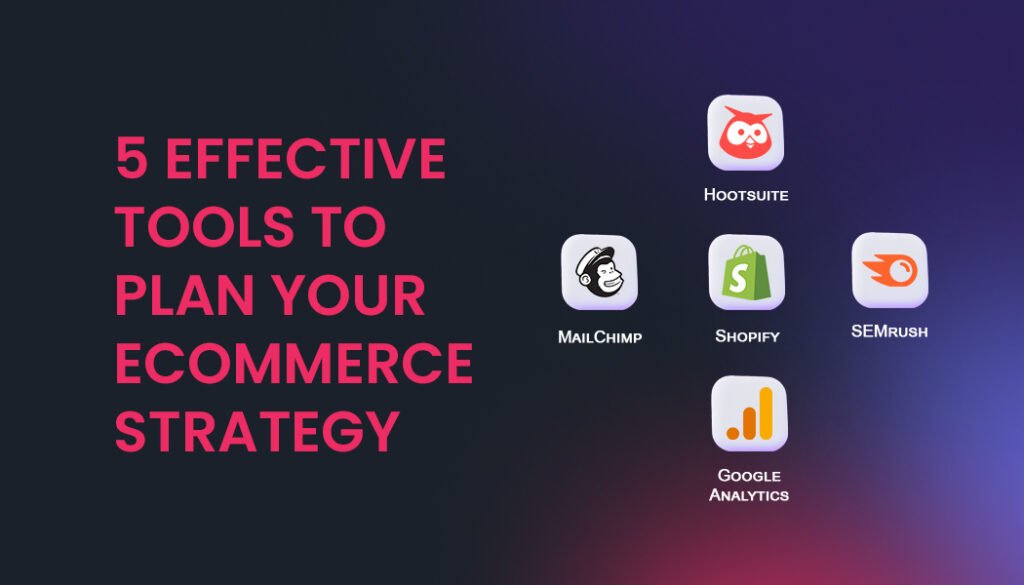
Tips To Plan Your Ecommerce Website
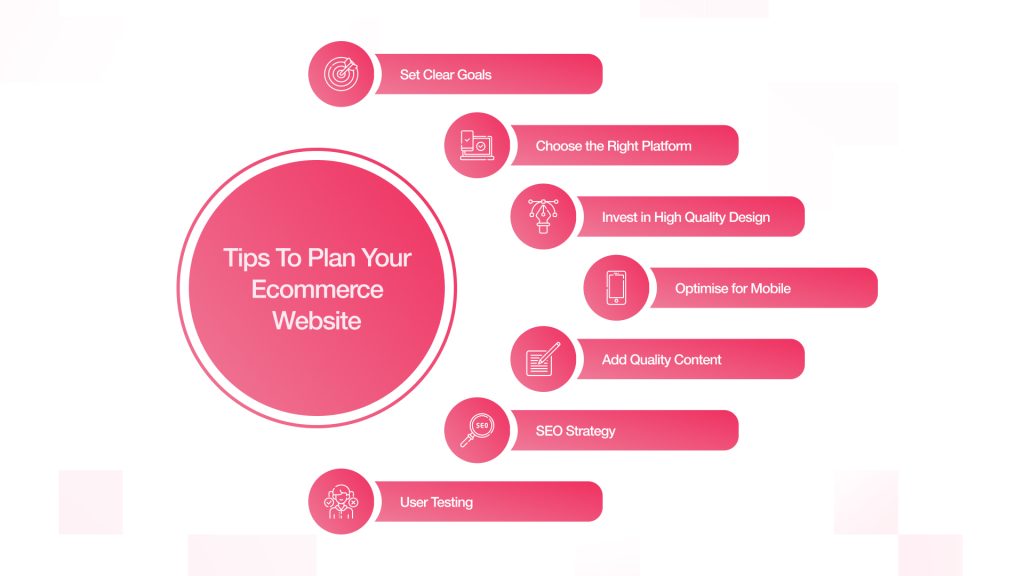
- Set Clear Goals: Define your objectives, target audience, and what you want to achieve with your ecommerce website.
- Choose the Right Platform: Select an eCommerce platform that aligns with your budget, needs, and scalability.
- Invest in High Quality Design: A well-designed website builds trust and improves user experience.
- Optimise for Mobile: Make sure your website is responsive and mobile-friendly for a broader reach.
- Add Quality Content: Engage your audience with high-quality product descriptions, images, and blog posts.
- SEO Strategy: Implement Search engine optimisation techniques to improve your website’s visibility on search engines.
- User Testing: Continuously gather user feedback and make improvements to enhance the user experience.
DIY or Hire a Professional Agency for Your Ecommerce Website?
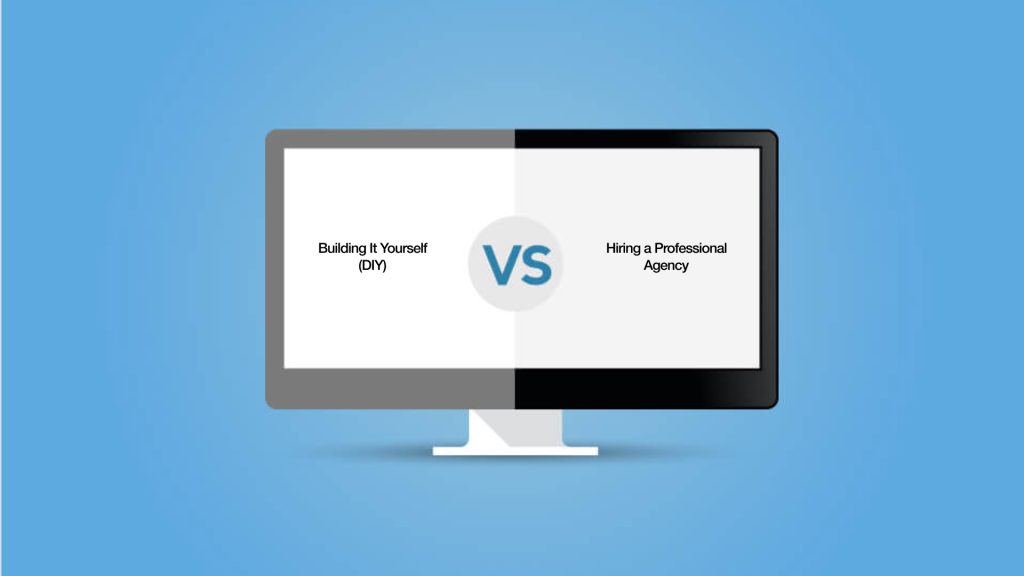
Building It Yourself
To develop your ecommerce website is something that can be overwhelming and can really put you off if you do not have any previous experience in web developing and designing. As a matter of fact, you having to take the first step you have to know that whether do it by yourself or hire a specialist to create the website Setting up and owning an online store saves a lot of money but there are also hosting charges, plugins, domain fees and other monthly subscription costs that such an ecommerce website entails.
Hiring a Professional Agency
A professional agency would set you back more financially on building your ecommerce site at the beginning, it may be worth the extra cost than eventually having to deal with problems that come with managing it yourself. Agencies determine their fee according to the complexity of the tracking, number of features suggested, and the scale of customization.
On the contrary, working with the site builder provides you with the ready-made website that meets your business needs, but, it might not be as easy to use commands as the website designed and built by agency for your business requirements.
Hurry! Launch Your Website for Just £500 Before This Offer Ends!
(Limited Time Offer)
Case Study
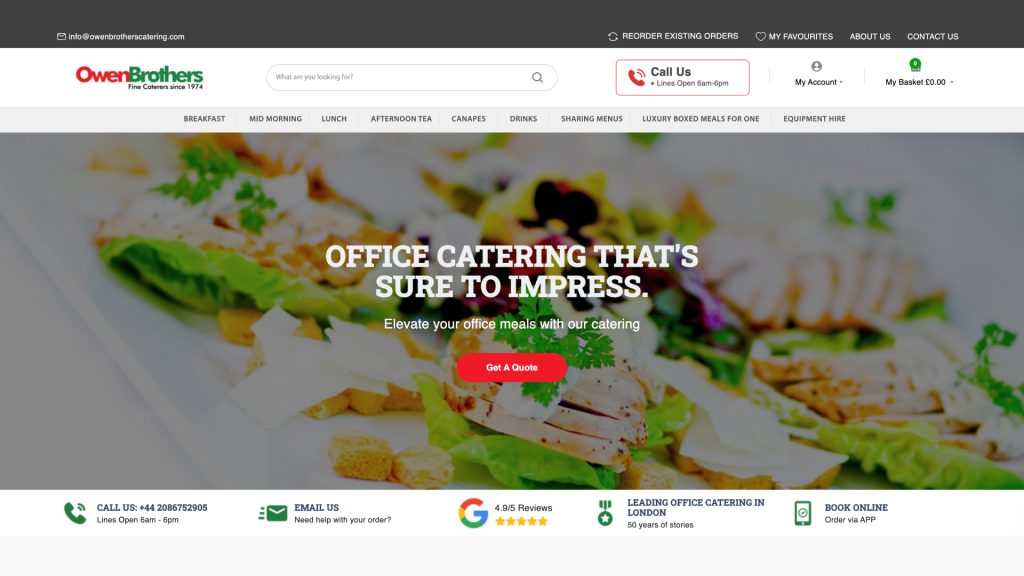
RVS Media worked with Owen Brothers Catering, the top office caterer in London, to update their website. We gave their ecommerce website a new look that is easy for people to use. This design made it simple for customers to find what they need and order quickly. With these changes, more people are completing their orders. This digital update makes it simple and fast for busy clients to order.
At the same time, we built a mobile app just for them. This app lets people order anytime and anywhere. It works well with the new website, giving everyone a smooth ordering experience.
The results speak for themselves:
- 150% increase in conversions
- 79% more ‘Add to Basket’ actions
- 71% drop in abandoned carts
- 245% growth in organic traffic
- 145% rise in SEO-driven orders
This case study shows how investing in ecommerce development delivers strong growth, better customer experience, and lasting business impact.
Wrapping Up
Building an ecommerce website involves a range of costs, but the investment can pay off in the long run by expanding your reach, increasing sales, and improving customer satisfaction. Remember to set clear goals, choose the right tools, and continuously optimise your strategy for success in the competitive world of ecommerce.
FAQs
Q1: Can I build an ecommerce website for free?
A1: While you can find free ecommerce platforms like WooCommerce, Wix keep in mind that there will still be costs involved in hosting, design, and maintenance.
Q2: What is the average cost to build a basic ecommerce website in the UK?
A2: The average price to make a simple ecommerce website in the UK is between £1,000 and £3,000. This is for the basics you need, like the website name, hosting, a standard platform such as Shopify Basic or WooCommerce, and a ready-made template.
Q3: Which ecommerce platform is the best for a Medium Sized business?
A3: Shopify and WooCommerce are famous choices for medium sized businesses due to their user-friendly easy interfaces and scalability.
Q4: How long does it take to build an ecommerce website?
A4: The timeline depends on the complexity of your website. It can range from a few weeks for a basic site to several months for a highly customised one.
Q5: What are some common security measures to protect my ecommerce website?
A5: Common security measures include using SSL certificates, regularly updating software and plugins, implementing strong password policies, conducting security audits, and considering a firewall and a Web Application Firewall (WAF) to protect against threats.
Q6: Are there any ongoing costs for maintaining an ecommerce website?
A6: Yes, there are ongoing costs such as hosting fees, domain renewal, payment processing fees, website maintenance, and potentially marketing expenses. Budgeting for these ongoing costs is crucial for the long-term success of your eCommerce business.
Q7: How much does a Shopify store cost per month in the UK?
A7: A Shopify store in the UK can cost between £19 and £389 or more each month for the subscription plans. The amount you pay will depend on the plan you pick, such as Basic Shopify, Shopify, Advanced Shopify, or Plus. There are also extra costs for apps, transaction fees, and any custom work you want done.
Q8: What are the most common hidden costs when building an ecommerce website?
A8: There are some costs that people may not think about when making an ecommerce website. You may need to pay for things like website security, extra plugins, and payment tools. The cost to make your site fast and work well for customers can go up too. Also, think about the money you might spend on good pictures, writing for your product pages, and marketing to get people to your site. Working with experts to help keep your site running well can add to the price. These extra costs can come up over time and might be more than what you pay at the start.
 Shopify
Shopify

















